What’s your space program(me)?
Home › Forums › Effecting change and the roles of the subject teachers and teacher-librarians / librarians in inquiry › What’s your space program(me)?
- This topic has 1 reply, 2 voices, and was last updated 5 years, 1 month ago by
 Elizabeth Hutchinson.
Elizabeth Hutchinson.
-
AuthorPosts
-
6th January 2021 at 4:36 pm #33717
I’ve spent most of the Christmas holiday working to prepare for IB DP Extended Essay seminar 2 (having pulled out all the stops last term to revamp our EE LibGuide for the 2020-22 cohort). I am not going to write in detail about our EE provision here – that is explored more thorgoughly on this thread in the Inquiry and resource design forum. Here I am more interested in explaining why I am prepared to invest all this effort in the EE. After all, this seems like a lot of effort for a cohort of around 30 students in a school of over 1000 – particularly as the majority of our Upper School students currently do A-level not the IB DP – so it is reasonable to ask why this amount of time and effort should be dedicated to this particular group of students. Of course every student is important, and I never forget that while I get multiple shots at getting our support (particularly for exam classes) right, for each year’s students that is their one and only opportunity, so I owe them all my best efforts every time. However, my time is not infinite and a friend of mine who was an Economics teacher used to remind me frequently that every choice carries an opportunity-cost. Time spent on this project is time I cannot spend on something else. So why do the IB EE students get so much of my time?
I realised last night that our Extended Essay support is my Space Programme. My big, costly (in my case in terms of time not money) project that aims for the stars – and produces the most amazing and unexpected spin-offs back on Earth. The benefits of space exploration, and whether they justify the costs, are widely debated and I don’t want to get into that debate here – but my point is that I throw everything I have at supporting the Extended Essay because it is a clearly defined, high stakes task that is guaranteed to be repeated every year and to require involvement and support from the Library AND because I know that, in doing so, I will produce breakthroughs in both understanding and resources that will benefit the whole school and the wider community.
For example:
- FOSIL only exists at all because his involvement in the EE process led Darryl to realise that the Upper School was too late for students to begin developing the skills they needed for a significant independent research task like the EE. He began to look for a systematic framework of skills he could use to guide him with embedding inquiry skills lower down the school, and came across The Empire State Information Fluency Continuum from which he developed FOSIL. That initial breakthrough has been of enormous benefit to our whole school, from Year 6 to Year 13 – including IB DP, A level and BTEC, as well as to a growing national and international community of educators.
- The Investigative Journal, originally developed for the EE, has become (in a variety of forms) a cornerstone resource in our support for inquiry throughout the school, and our Research Organiser is a great place to start when helping students to plan an argumentative essay or a debate – we now use an adapted version for our Individual Project in Year 9, for example. Every year I find some area where I can improve our EE resources (for example, last year we added a Keyword Record graphic organiser to help students to search more systematically) confident that any new resources developed will have almost immediate applications elsewhere in the school.
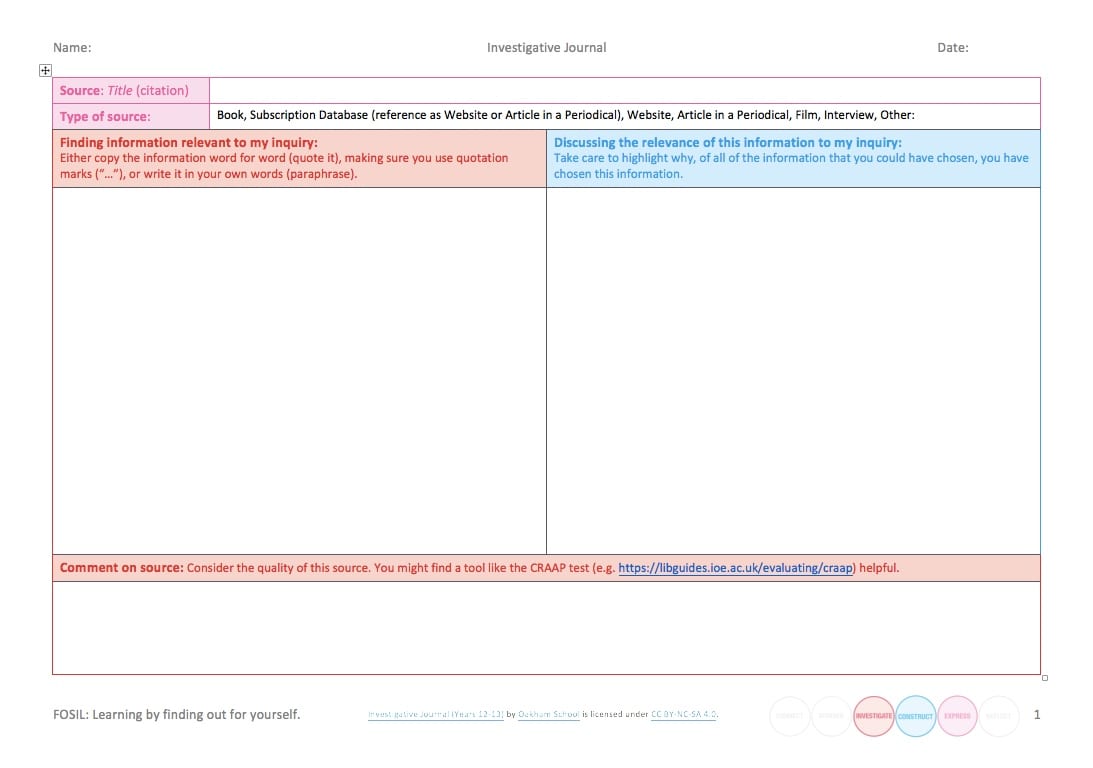
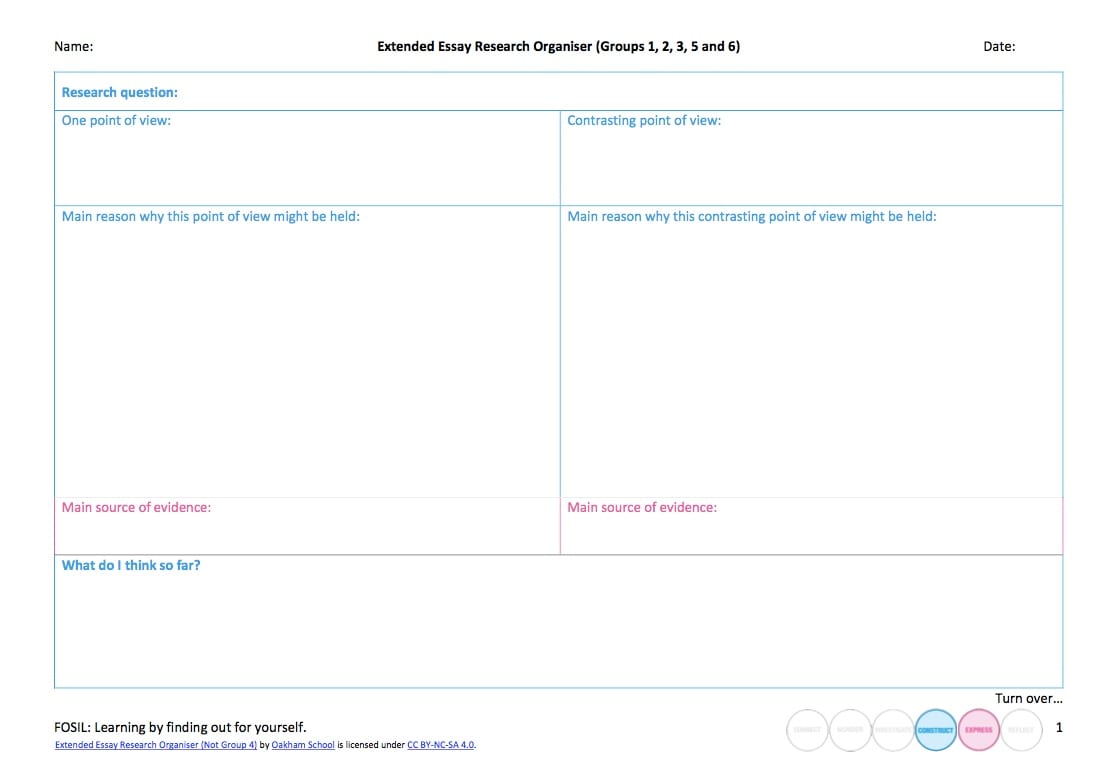
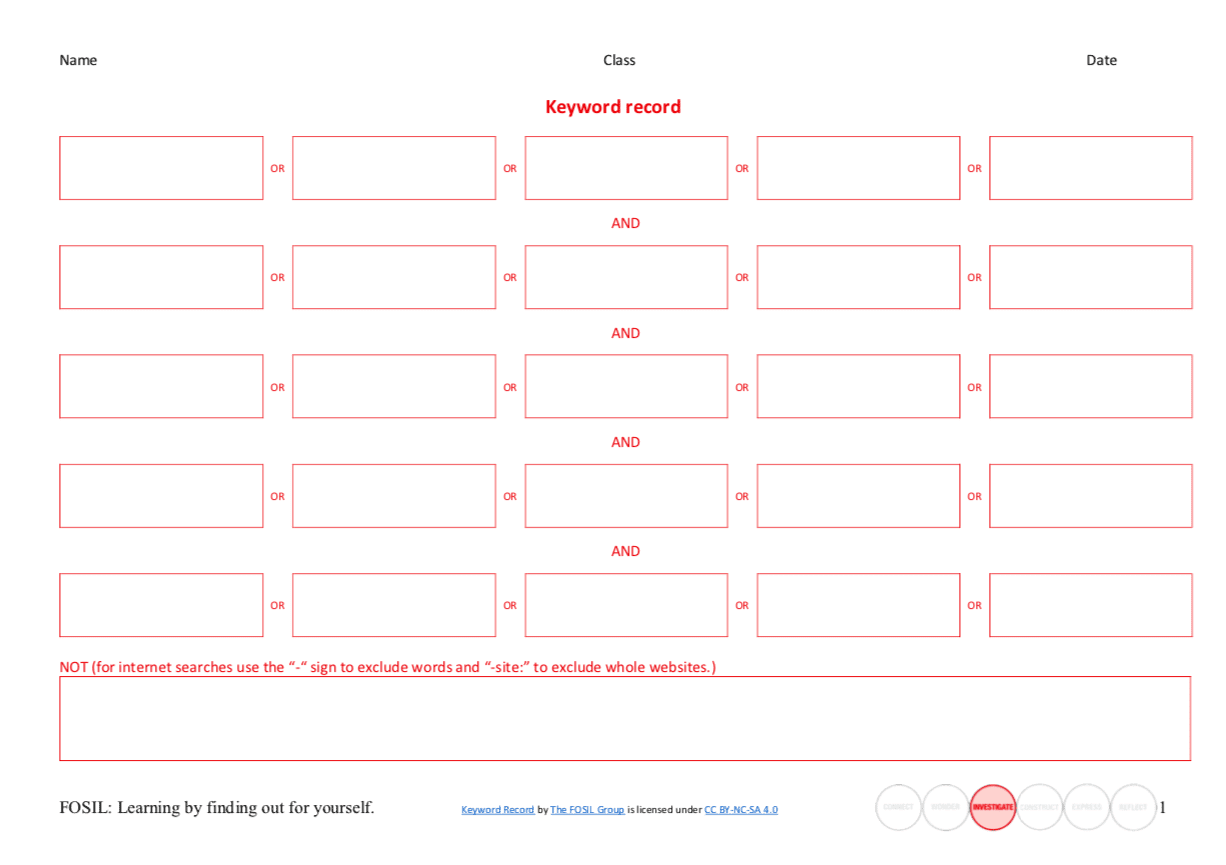
- In October 2019 we took the plunge and acquired a LibGuides subscription, largely because of the benefits we knew it would offer in delivering effective online support for the EE. While we would not have made such an expensive purchase purely for the EE, that was certainly the original driver. Having devoted a great deal of time and energy to learning to use the platform effectively in order to be ready for various milestones in the EE process, we are absolutely blown away by how the platform has transformed our provision across the school. So much so that we have moved our Library homepage away from our LMS (which is excellent, but not nearly as easy to turn into a responsive, user-friendly, multi-purpose homepage) and onto LibGuides. The timing was particularly fortunate as we had just about had time to become familiar with the system and to start shifting some of our support online before the March 2020 lockdown, when all teaching went online for the entire summer term, which certainly accelerated the process. The system is now fully embedded in our provision at all levels – and (combined with our LMS) was an important factor in our successful click-and-collect provision last term for those who were not able to physically access the Library. This powerfully demonstrates that lessons, resources and innovations we develop for the EE benefit our entire service, including the ‘reading for recreation’ side as well as the more obviously inquiry-oriented ‘reading for information’ side.
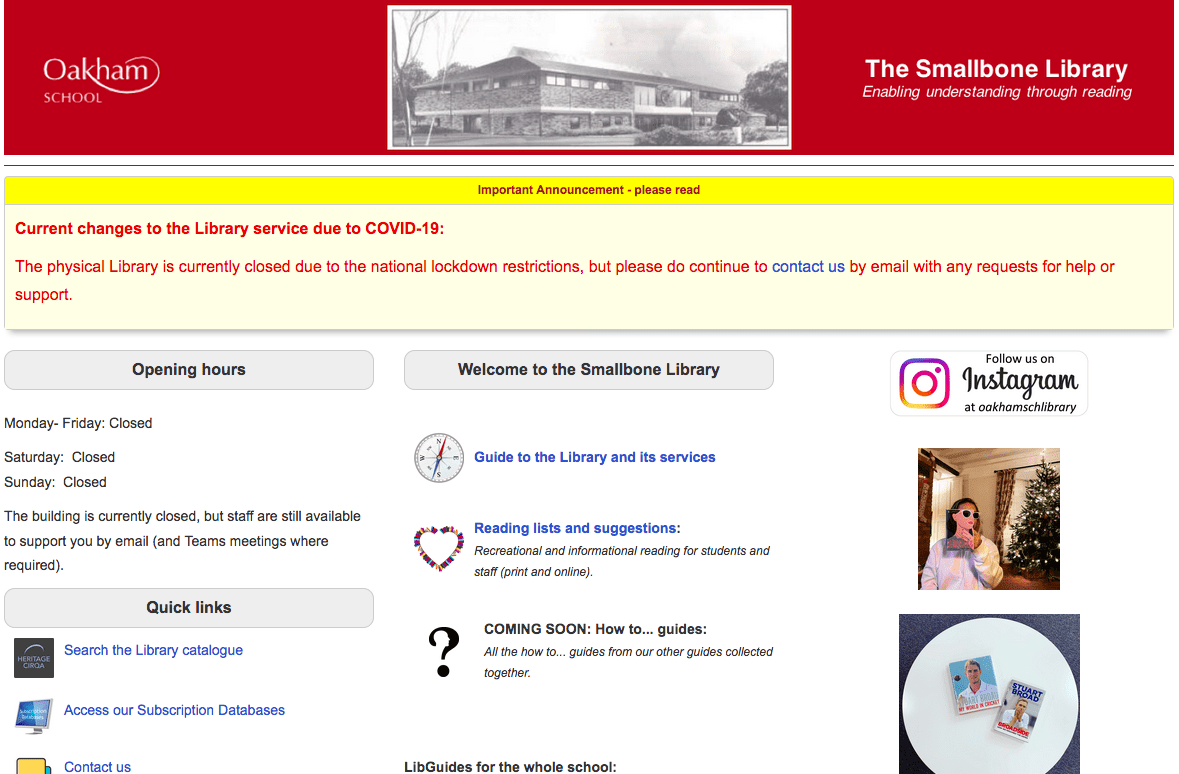
- Last summer we (like many subject teachers) had to learn very rapidly how to produce good quality video tutorials and effective online Forms for data collection, in time for EE Writing Week, which was supported entirely online during the lockdown. All those skills continue to be useful across the school, and will be so even when things eventually return to normal, allowing us to provide much more 24-7 online ‘point of need’ support. I also learnt a lot of lessons on the first iteration of our EE LibGuide, which I revamped completely for this season.
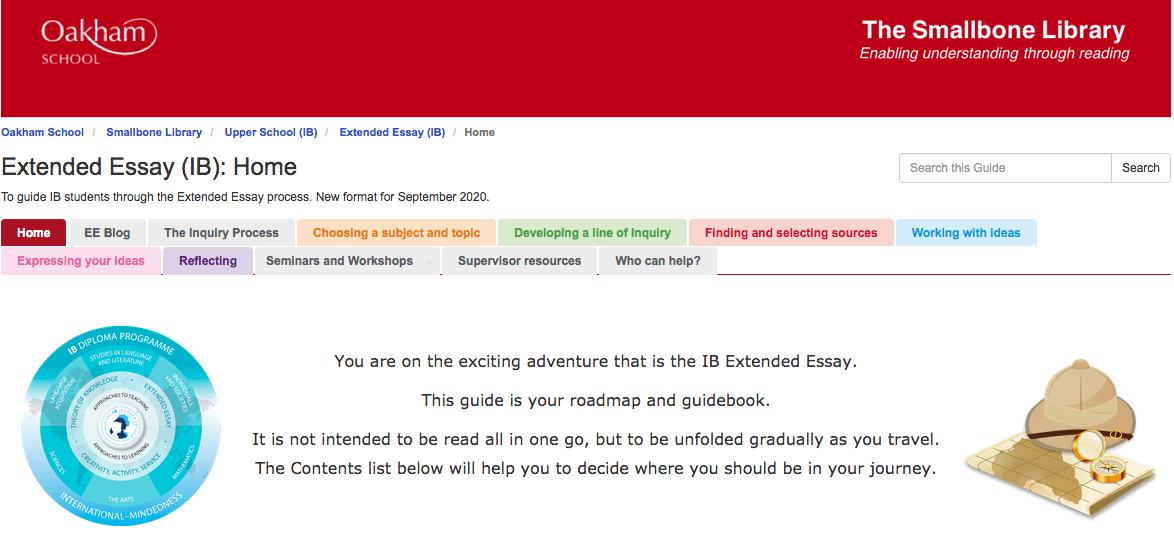
- My big project this holiday was to pull all the information on our Subscription Databases into LibGuides (except the login details as those need to remain on a password/SSO protected Sharepoint page) in time for EE Seminar 2. This project is still ongoing, but it is a huge leap forward because it now allows users to search and sort our databases by subject and school level, or by type, and makes it easier for us to share database specific tutorials. This solves the problem of new users being confronted by an overwhelming list of subscription databases on a fairly plain Sharepoint page, and makes them easier to navigate for students and staff alike (or at least, that’s the theory).
This page:
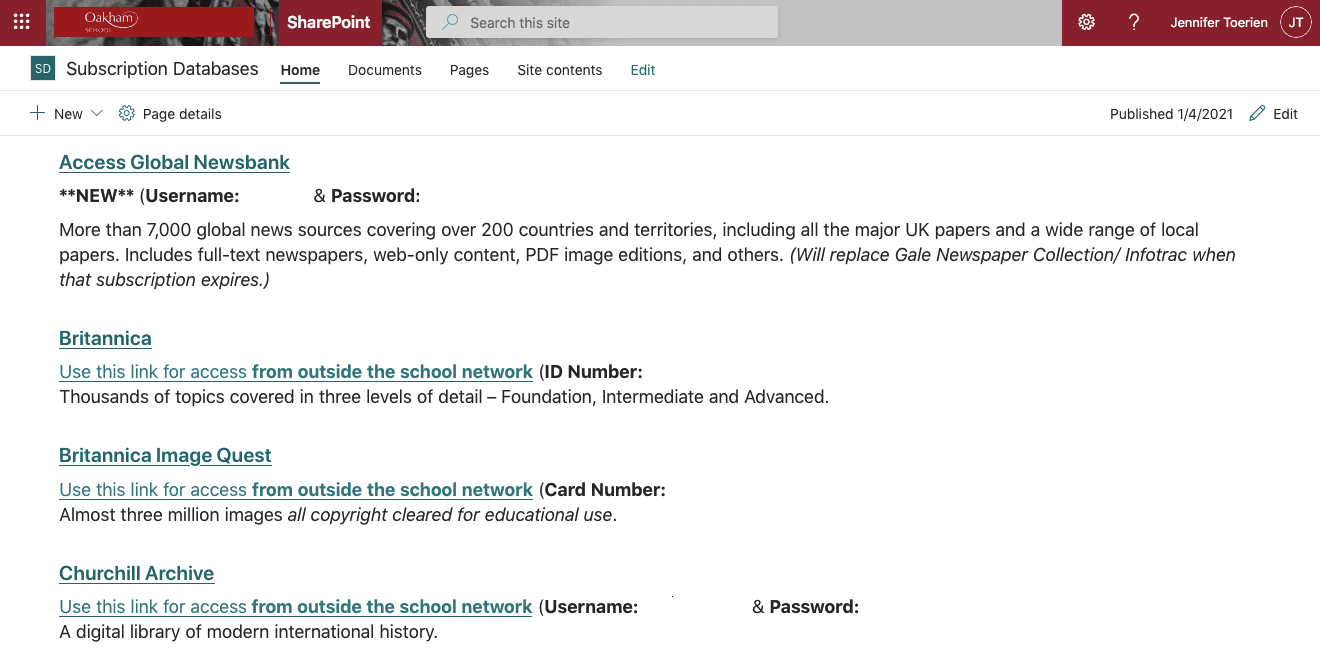
Now sits behind this page:
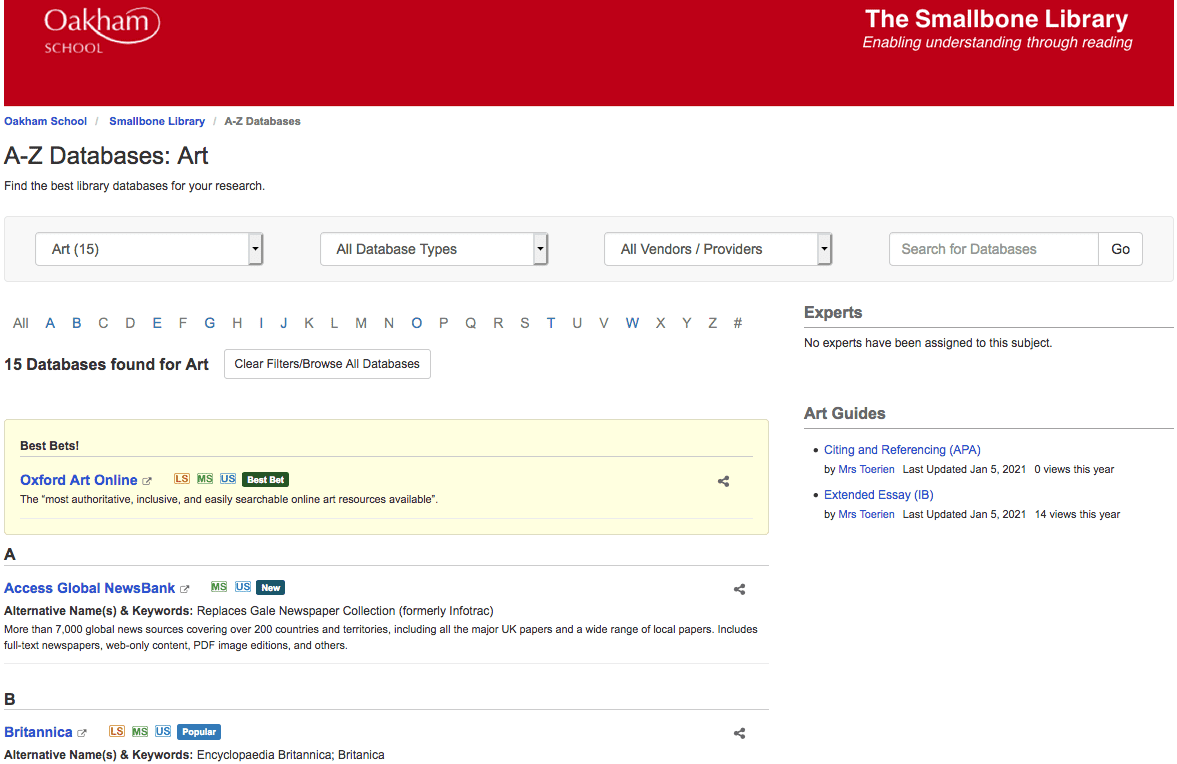
 My point is that none of this would have happened without the constant stimulus of my own personal ‘Space Programme’. For me the key features of a Space Programme project are:
My point is that none of this would have happened without the constant stimulus of my own personal ‘Space Programme’. For me the key features of a Space Programme project are:- It happens every year, throughout the year at fixed times (so I have deadlines to meet that drive me forward);
- The Library is always integral to the process and I have a fair degree of control over how support is delivered;
- It steps students systematically through the whole inquiry process over a fairly long period of time, so I need to pay attention to every stage;
- It is a high stakes process because it involves public exam students who rely on the support I provide;
- It involves significant collaboration with other experienced and committed staff (such as, in this case, the Head of Student Research, who brings a very valuable subject specialist/ supervisor perspective as well as significant pedagogical expertise).
What do others think? Do you have an ongoing project that, on the surface, you commit a disproportionate amount of time and energy to but that pays back huge, and sometimes unexpected dividends across all areas of your work? If you don’t, do you think there could be benefit in trying to find one?
[Space shuttle image by WikiImages from Pixabay]
10th January 2021 at 6:58 am #33997Thanks for sharing your fascinating journey with us Jenny. I often feel that I don’t give one project enough time, that I do a little here and a little there and often spreading myself too thinly. I think this is a leftover from trying to say yes to everything that comes my way in case I miss an opportunity. I think you are right though. It is a good idea to focus on something specific enabling it to become something great but also provide opportunities for others in the process. I am hoping to work with a couple of librarians over the next few months on specific projects so if this happens I will try and encourage them to share our learning and discover.
-
AuthorPosts
- You must be logged in to reply to this topic.


